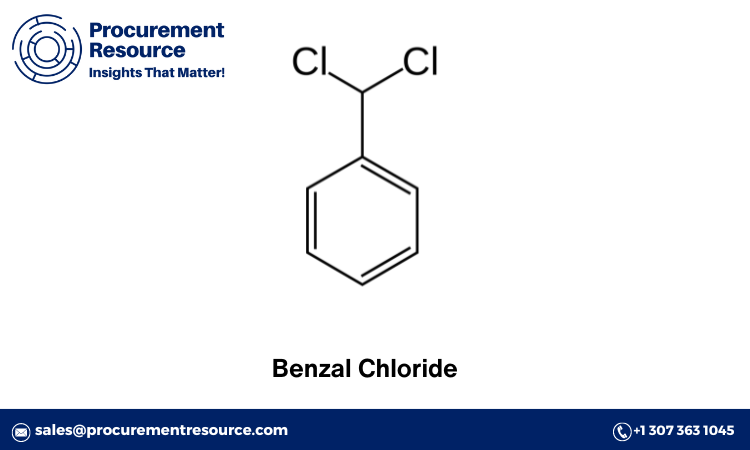Benzal Chloride, a crucial intermediate chemical compound used in the manufacturing of various chemicals and materials, plays a pivotal role in industries such as pharmaceuticals, agrochemicals, and polymers. As the demand for this compound increases across various applications, the need for a structured approach to setting up and managing a Benzal Chloride Manufacturing Plant has gained considerable attention. This Benzal Chloride Manufacturing Plant Project Report provides a comprehensive analysis of the cost model, market drivers, feedstocks, top manufacturers, and the manufacturing process involved in setting up such a facility.
Introduction to Benzal Chloride Manufacturing
Benzal Chloride (C6H5CHCl2) is a versatile chemical used primarily in the production of other chemicals, especially in the agrochemical and pharmaceutical industries. It is a key building block in the synthesis of benzophenone derivatives, which have applications in plastics, coatings, and other materials. Given its significance, the Benzal Chloride Manufacturing Plant Project Report addresses the key factors required to establish and operate such a plant efficiently.
Request Your Free Sample Report – https://www.procurementresource.com/reports/benzal-chloride-manufacturing-plant-project-report/request-sample
Cost Model for Benzal Chloride Manufacturing
One of the first considerations in establishing a Benzal Chloride Manufacturing Plant is the cost model. Understanding the overall investment requirements is essential for accurate financial planning. The cost of setting up a benzal chloride plant involves various elements such as capital expenditure (CAPEX), operational expenditure (OPEX), and raw material costs. Here’s a breakdown:
- Capital Expenditure (CAPEX): This includes the costs associated with plant construction, equipment, machinery, and other infrastructure. Depending on the size and capacity of the plant, this cost can vary widely. Typically, setting up a medium-scale plant can cost between $2 million to $5 million.
- Operational Expenditure (OPEX): Ongoing operational costs include labor, utilities (water, electricity), maintenance of equipment, and other consumables. On average, operational costs can range between $300,000 to $1 million annually, depending on the scale of production.
- Raw Material Costs: Benzal chloride is synthesized from toluene or benzene, which serves as the primary feedstock. The cost of these raw materials, along with other auxiliary chemicals such as chlorine, plays a significant role in the overall production cost.
- Procurement Resources: It’s essential to establish a reliable procurement resource chain for raw materials and equipment. Suppliers of toluene, benzene, and chlorine should be identified and secured to avoid disruptions in production.
Market Drivers for Benzal Chloride Manufacturing
The growth of the Benzal Chloride Manufacturing Plant Project is largely driven by the demand in key end-use industries. Some of the primary market drivers include:
- Pharmaceutical Industry Demand: Benzal Chloride is used in the synthesis of active pharmaceutical ingredients (APIs) that treat a range of health issues, such as skin diseases, cancers, and other disorders. This ongoing demand for pharmaceutical formulations is expected to keep the benzal chloride market robust.
- Agrochemical Industry Growth: The agrochemical sector has witnessed consistent growth, with benzal chloride being used in the formulation of pesticides and herbicides. With the increase in global agricultural activities and the need for effective crop protection, this market is expected to drive demand.
- Polymer and Plastic Industry: Benzal chloride serves as a precursor to certain polymers used in the manufacturing of high-performance plastics and coatings. The demand for durable and sustainable materials for automotive and construction industries contributes to the growth of this sector.
- Technological Advancements: The introduction of more efficient production methods and technologies that reduce energy consumption, lower production costs, and minimize environmental impacts plays a significant role in boosting the viability of new benzal chloride plants.
- Environmental Regulations: Stricter environmental regulations are also impacting production. Modern plants are expected to implement sustainable practices such as waste treatment and the minimization of harmful emissions, further affecting the operational costs and plant designs.
Read Full Report With Table Of Contents: https://www.procurementresource.com/reports/benzal-chloride-manufacturing-plant-project-report/toc
Top Manufacturers in Benzal Chloride Production
In the global benzal chloride market, several companies dominate the landscape. These top manufacturers include:
- Eastman Chemical Company: A leading player in the chemical manufacturing industry, Eastman is one of the top producers of benzal chloride. The company has a strong market presence in multiple regions, including North America, Europe, and Asia.
- Shandong Jinling Group: A significant player in the Chinese market, Shandong Jinling Group is known for its competitive pricing and large-scale production capabilities, making it one of the top manufacturers in the region.
- Finetech Industry Limited: Based in Taiwan, Finetech is known for producing high-quality benzal chloride used in a variety of industrial applications, including the production of agrochemicals and pharmaceuticals.
- Hubei Jusheng Technology Co., Ltd.: Located in China, Hubei Jusheng is another leading manufacturer specializing in the production of various chlorinated organic compounds, including benzal chloride.
- BASF SE: A global giant in the chemical industry, BASF’s extensive R&D and manufacturing facilities contribute to its strong position in the benzal chloride market, focusing on quality, sustainability, and cost efficiency.
Manufacturing Process for Benzal Chloride
The Benzal Chloride Manufacturing Plant Project Report also outlines the steps involved in the manufacturing process of benzal chloride. Here is an overview of the general procedure:
- Chlorination of Toluene: Benzal chloride is primarily synthesized by chlorinating toluene (C7H8) in the presence of chlorine gas (Cl2). This reaction typically occurs in the presence of a catalyst, often iron or aluminum chloride, to facilitate the chlorination process.
The reaction produces benzal chloride and hydrogen chloride gas as by-products.
- Separation and Purification: After the chlorination process, the reaction mixture is separated, and impurities are removed. The resulting product is then purified using distillation techniques to obtain high-quality benzal chloride.
- Post-Processing: Depending on the desired purity level, further post-processing steps, such as drying and filtration, are employed to eliminate any remaining contaminants.
- Packaging: The final product is carefully packaged in suitable containers for storage and distribution to customers in industries such as pharmaceuticals, agrochemicals, and plastics.
Feedstocks for Benzal Chloride Manufacturing
The primary feedstock used in the production of benzal chloride is toluene, followed by chlorine gas. Both of these materials are readily available in the global market, ensuring that the supply chain for a Benzal Chloride Manufacturing Plant remains stable and cost-effective. The use of high-purity raw materials is critical to producing benzal chloride that meets industry standards.
- Toluene: A common solvent in the petrochemical industry, toluene is readily available from various suppliers worldwide. It is often sourced from refining operations or chemical plants.
- Chlorine Gas: Chlorine is another essential feedstock, often produced through the electrolysis of saltwater. It is a widely available chemical with established distribution channels globally.
Key Insights for Establishing a Benzal Chloride Manufacturing Plant
- Investment in R&D: Research and development efforts focused on improving the production efficiency of benzal chloride can lead to reduced costs and higher margins. Investing in sustainable and cost-effective production methods is essential for long-term success.
- Environmental Considerations: Environmental regulations play a significant role in shaping the operational dynamics of a benzal chloride plant. From waste management to emissions control, incorporating sustainable practices can help maintain compliance with regulatory standards.
- Scalability and Automation: The scalability of the plant and the integration of automation technologies can greatly impact production efficiency. Automation helps reduce labor costs and minimizes the risk of human error, ensuring consistent product quality.
- Supply Chain and Distribution: Securing a reliable supply chain for feedstocks and a robust distribution network for the final product is essential for the smooth operation of a Benzal Chloride Manufacturing Plant.
The Benzal Chloride Manufacturing Plant Project Report offers a detailed perspective on setting up a successful benzal chloride manufacturing operation. From understanding the cost structure to identifying market drivers and analyzing the manufacturing process, this report serves as a roadmap for potential investors and entrepreneurs interested in entering the chemical manufacturing sector. By focusing on efficient operations, high-quality feedstocks, and strong procurement resources, companies can capitalize on the growing demand for benzal chloride in various industries.
Contact Us:
Company Name: Procurement Resource
Contact Person: Endru Smith
Email: sales@procurementresource.com
Toll-Free Number: USA & Canada - Phone no: +1 307 363 1045 | UK - Phone no: +44 7537171117 | Asia-Pacific (APAC) - Phone no: +91 1203185500
Address: 30 North Gould Street, Sheridan, WY 82801, USA







Leave A Comment